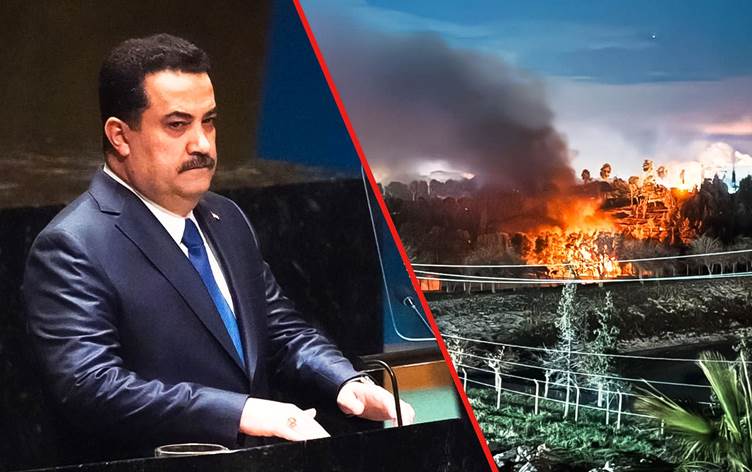
Iraqi Prime Minister Mohammed Shia' al-Sudani addresses the 78th UNGA in New York City on September 22, 2023. Photo: Bryan R. Smith/AFP; Residence of Peshraw Dizayee in Erbil targeted by IRGC ballistic missiles on January 16, 2023. Photo: Rudaw; Graphic: Rudaw
ERBIL, Kurdistan Region - The Iraqi government has adopted a firm stance against the Iranian Revolutionary Guard (IRGC) attack on Erbil, labeling it as "Iranian aggression” and declaring it would file a complaint against Iran's hostilities to the United Nations Security Council in New York.
At the initiative of Prime Minister Mohammed Shia' al-Sudani, this position marks the toughest stance Iraq has taken against Iranian attacks since the fall of former dictator Saddam Hussein's regime.
The Iraqi foreign ministry issued a statement on Tuesday condemning the attack and labeling it as “Iranian aggression.”
"The government of the Republic of Iraq expresses its strong condemnation and denunciation against Iran's aggression on Erbil for striking civilian areas with ballistic missiles, resulting in civilian casualties,” it read.
"The Iraqi government considers this act an aggression against Iraqi sovereignty and the security of the Iraqi people, as well as an insult to good neighborliness and regional security," it added. Iraq has decided to escalate its response to the international level, stating that it "will take all legal measures, including filing a complaint with the UN Security Council."
The statement from Sudani added that a committee would be set up to investigate the attack as well as to “gather information to support the government's position at the international level.”
The results will be published for Iraqi and international public opinion to "expose the falsehood of the excuses behind these shameful acts,” it added.
In response to the attack, the Iraqi Foreign Ministry summoned Abu al-Fadhel Azizi, the charge d'affaires of the Iranian embassy in Baghdad, and handed him a note of protest. The ministry then recalled the Iraqi ambassador to Tehran, Nasser Abdul Mohsen, back to Baghdad to discuss the Iranian attack on Erbil.
In the late hours of Monday, Iran’s Islamic Revolutionary Guard Corps (IRGC) launched 10 ballistic missiles toward the Kurdistan Region’s capital Erbil, under the pretext of targeting “spy headquarters” of anti-Iran groups, killing at least four and wounding 17 others.
At least five missiles struck Kurdish businessman Peshraw Dizayee’s residence, killing him and three others.
Iraqi National Security Advisor Qasim al-Araji, who heads the five-member Iraqi government's committee of inquiry, visited Dizayee’s residence to investigate the attack. The committee has 48 hours to submit its recommendations to Sudani.
Araji also slammed Iran’s claims that a Mossad headquarter was targeted in the attack as “baseless.”
Iraqi Prime Minister’s security adviser Hussein Allawi told Rudaw on Tuesday that the committee's evidence will be part of the complaint submitted to the UN Security Council.
The IRGC attack elicited strong condemnation and the decision to form a committee of inquiry in Iraq presents a stance that Iran may not have expected from Baghdad. This also prompted other countries to react strongly to the Iranian attack.
The Iraqi Foreign Ministry issued three statements in less than four hours regarding the attacks on Erbil. One clarified its position, while the other two outlined the actions it intends to take.
Among those killed were Dizayee’s 11-month-old daughter Zhina, a housekeeper identified as Michelle, a Philippines national, and Iraqi businessman Karam Mikhail.
Mikhail, who was born in 1981 in Mosul but lived and studied in the UK, was a father of two children and owner of Rayan Company. He was attending a social gathering at the Dizayee household.
This is the second time that Iran has targeted the homes of investors in Erbil on the pretext of attacking Israeli intelligence bases. The first was a missile attack that took place on the morning of March 13, 2022 where the Revolutionary Guards claimed to target an “Israeli intelligence base.” An Iraqi government's committee of inquiry later stated that Iran's excuse was false and that no Israeli bases had been targeted in Erbil.
The Iraqi government, at the time led by Mustafa al-Kadhimi, described the attack as a violation of neighborly relations and the historic ties that bind the two peoples together. Although he submitted a memorandum of protest to the Iranian embassy, he did not file a complaint against Iran at the UN Security Council.








Comments
Rudaw moderates all comments submitted on our website. We welcome comments which are relevant to the article and encourage further discussion about the issues that matter to you. We also welcome constructive criticism about Rudaw.
To be approved for publication, however, your comments must meet our community guidelines.
We will not tolerate the following: profanity, threats, personal attacks, vulgarity, abuse (such as sexism, racism, homophobia or xenophobia), or commercial or personal promotion.
Comments that do not meet our guidelines will be rejected. Comments are not edited – they are either approved or rejected.
Post a comment